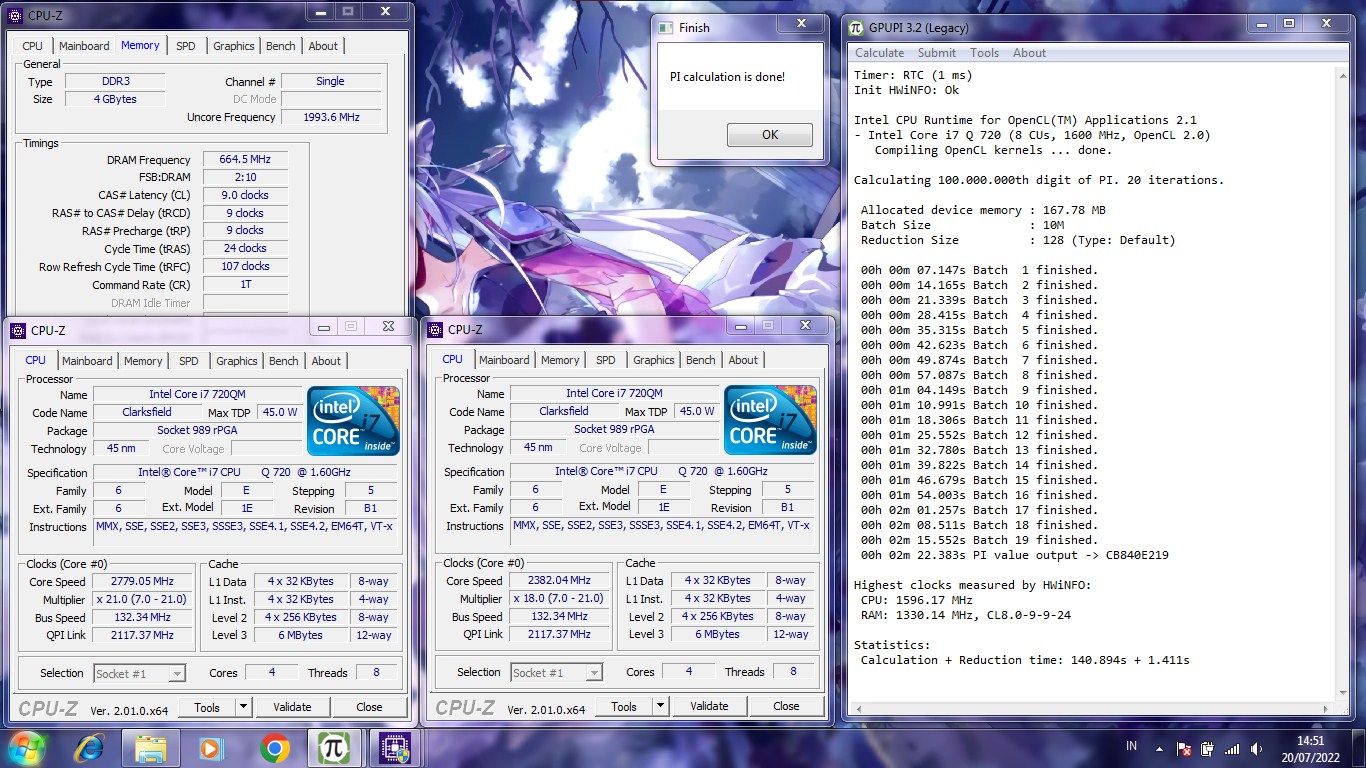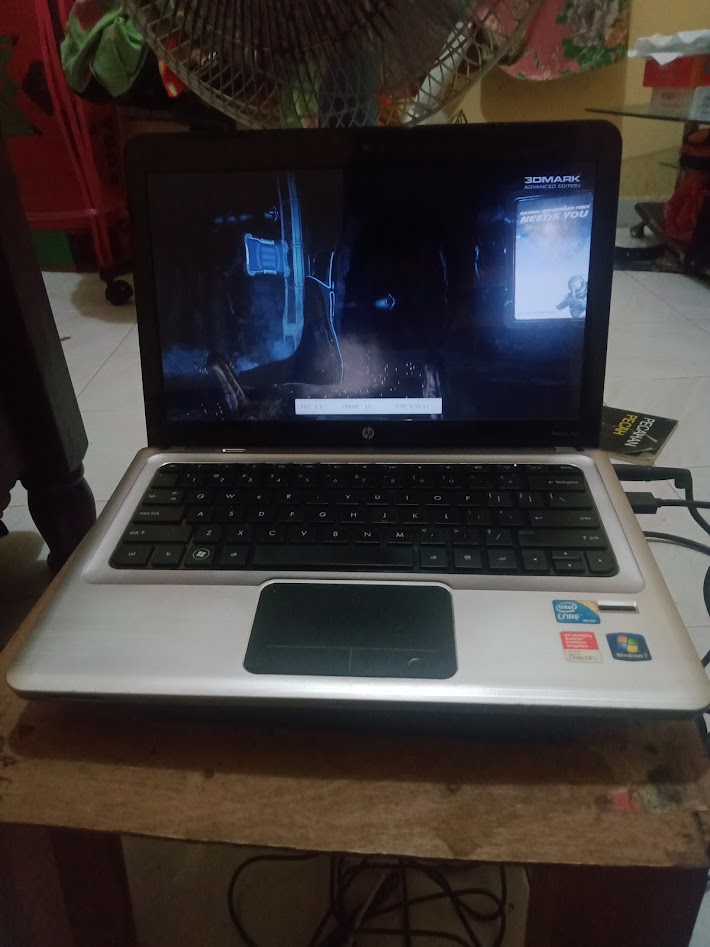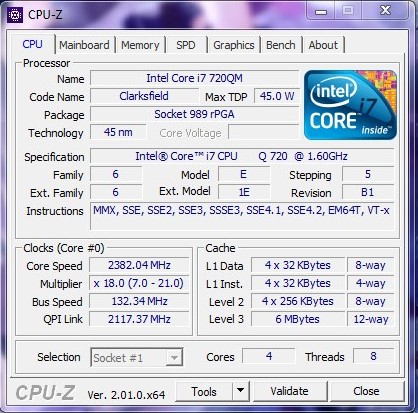GPUPI for CPU - 100M score 2min 22sec 383ms with a i7-720QM
Thursday, 01 January 1970 07:00 | Update at null
Media Gallery
Screenshot

Device, Setup, etc



URL
https://hwbot.org/submission/5044479https://bit.ly/3AsO2Gz
Information Detail
Hardware: Intel Core i7 720QM
Specs:CPUID : Intel(R) Core(TM) i7 CPU Q 720 @ 1.60GHz
Architecture : x86
Codename : Clarksfield
L3 Cache : 6MB
Clock : 1.60GHz - 2.80GHz
Core/Thread : 4/8
TDP : 45W
Technology : 45nm
Socket : PGA988
IGPU : -
See more specification...
Software: GPUPI for CPU - 100M
Score: 2min 22sec 383ms
About: GPUPI for CPU - 100MGPUPI for CPU – 100M is a benchmark designed to measure the performance of a processor (CPU) in performing intensive mathematical calculations, specifically in calculating the value of π (pi) to 100 million decimal places. This benchmark uses the BBP (Bailey–Borwein–Plouffe) algorithm, which has been optimized for high performance on modern systems, and supports various CPU architectures and instructions.
Although GPUPI was originally developed for GPUs, the “for CPU” version enables testing of numerical processing performance using the full CPU core. This test is highly demanding and is often used to evaluate system stability, single-core performance, and multi-core performance of a CPU. In the 100M configuration, this benchmark provides a moderate-to-heavy workload that adequately represents system performance in scientific calculation scenarios, data analysis, and encoding tasks.
This benchmark automatically detects and utilizes all available threads in the system to accelerate the computation process, but it can also be run in a limited thread mode for more specific testing. The final score is displayed in units of time (seconds), where a lower number indicates better performance.
GPUPI for CPU – 100M is also a popular choice in the overclocking community due to its consistency in delivering precise results and its sensitivity to changes in frequency and system stability. With its heavy and stable workload, this benchmark can also be used for stress testing and system validation in extreme configurations.
Additionally, GPUPI supports integration with BenchMate, which provides score verification and protection against benchmark result manipulation, making it a reliable tool for competitions and professional hardware evaluations.
Overall, GPUPI for CPU – 100M is an ideal benchmark for measuring a processor's arithmetic capabilities under real-world conditions, particularly in tasks that heavily rely on numerical performance and system stability.
The Intel Core i7-720QM, launched in Q3 2009, was one of the first mobile quad-core processors to feature Intel's Nehalem microarchitecture, specifically the Clarksfield variant. Targeted at high-performance laptops, such as gaming machines and mobile workstations, the i7-720QM brought 4 physical cores and 8 threads to the mobile platform, thanks to Hyper-Threading Technology providing a significant boost in multi-threaded workloads like video editing, 3D rendering, and other professional-grade applications. The processor runs at a base clock speed of 1.6 GHz, but it can dynamically increase up to 2.8 GHz using Intel Turbo Boost, depending on thermal headroom and power availability.
Manufactured using a 45nm process, the i7-720QM has a TDP of 45W, which is quite high by today's mobile CPU standards. This thermal demand necessitated more robust cooling solutions in laptops that featured the chip. Unlike modern CPUs, the i7-720QM does not come with integrated graphics, which means systems based on this processor require a dedicated GPU often from AMD or NVIDIA for graphics processing and display output. As such, it was typically paired with mid-to-high-end discrete graphics cards in its time, making it a solid choice for gaming and multimedia laptops in the late 2000s and early 2010s.
While the Core i7-720QM was a powerhouse during its release, its performance and efficiency are significantly outpaced by modern CPUs built on smaller nodes and with higher IPC (Instructions Per Clock). Nevertheless, legacy laptops using the i7-720QM can still be viable for basic computing tasks like web browsing, document editing, or watching videos especially if paired with an SSD upgrade and increased RAM. Users running Windows 10 on such systems may experience some limitations, but with proper optimization and lightweight software, the CPU can still deliver a usable experience in non-demanding environments.
Hardware Detail:
Device: HP Pavilion dv3-4054TX
RAM: 4GB DDR3 Single Channel
OS: Windows 7, Windows 10
* Not Avaiable
